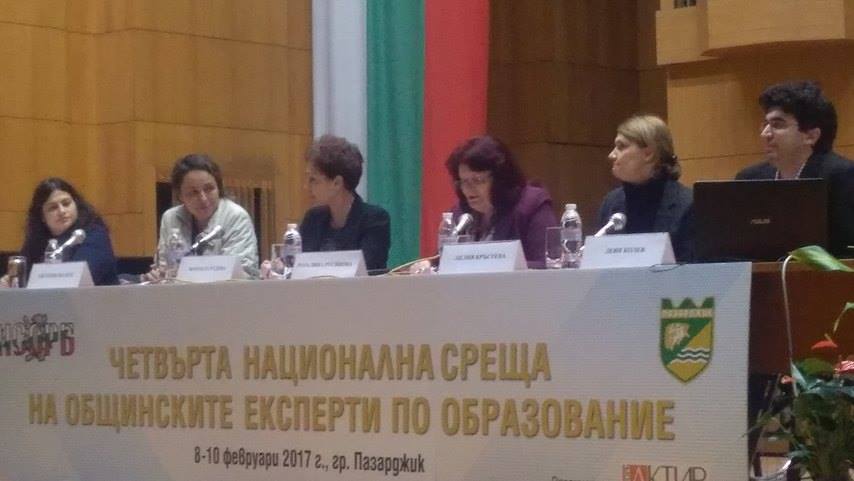17.02.2017National Association of Municipalities supported ceration of unified schools during the annual meeting with local experts
 The majority of municipalities willing to support primary schools in villages to transform into unified, ie training students from 1st to 10th grade. That applies especially to the villages where more conservative groups of Roma, Turks, Bulgarian Muslims and other ethnic groups live, in which girls rarely continue to secondary education. National Association of Municipalities supports these efforts.
The majority of municipalities willing to support primary schools in villages to transform into unified, ie training students from 1st to 10th grade. That applies especially to the villages where more conservative groups of Roma, Turks, Bulgarian Muslims and other ethnic groups live, in which girls rarely continue to secondary education. National Association of Municipalities supports these efforts.
That became clear during the fourth national meeting of municipal experts on education organized by NAMB in Pazardzhik from 8 to 10 of February. The topic was set by Deyan Kolev from Center "Amalipe", who was one of the moderators at the discussion forum "The range of children of compulsory school age - a common task of Municipalities, Ministry of Education and NGOs."
"What is unified school and could it be possible?" - Asked in his presentation Kolev. And he answered, "Absolutely yes, because:
1. Unified schools have a chance to increase the range of young people from villages and especially of Roma girls in secondary education;
2. Unified Schools are a chance for the development of schools in the villages after the Education Act takes their eighth grade;
3. Unified schools have a chance to improve the quality of education in rural schools."
Kolev presented the key steps that municipalities must take to create unified schools that persist in the first high school stage all young people, providing high quality education and the opportunity to continue in the second high school stage. "The decision is yours, to the Municipal Council. Do not worry if the regional department of education will give a positive opinion: the law requires opinion, not agreement of the RDE"- said Kolev. He appealed to the municipalities to support the development of unified schools in villages and not to do in the towns, as the transformation of urban "Roma" schools from primary to unified will reinforce segregation.
Theodora Dacheva by the National Association of Municipalities also encouraged municipalities to support the development of integrated schools in the villages. The criteria MES gave to RDE were only indicative and non-binding, said Dacheva, emphasizing the crucial role of municipalities in this process.
Experts from many municipalities have expressed their attitude to assist in the transformation of rural primary schools in unified ones. Their main arguments were related to ensuring more complete coverage in secondary education, as well as support for the preservation and development of schools in the villages.
The discussion forum "The range of children of compulsory school age - a common task of Municipalities, Ministry of Education and NGOs" was organized in partnership with the Trust for social alternative. Eugenia Volen and Galia Marinova by TSA presented two programs of the Foundation, aimed at the full range:
- "Ready for School": ensuring a more complete coverage in pre-school education for children from vulnerable groups;
- "Equal opportunity - access to secondary education": supporting young people from villages that with training in high schools.
Manuela Radeva, director of the Center for Educational Integration of Children and students from ethnic minorities, presented the activities of the Center. She focused on tender procedures announced by the Centre and their accessibility even for smaller schools and kindergartens.
In her detailed presentation Lilia Krasteva, head of research, analysis and methodologies; monitoring and evaluation of the Centre for Inclusive Education examined the challenges facing municipalities in ensuring quality inclusive education.
Amalipe name was repeatedly mentioned during the discussion forum. Many local experts highlighted the excellent work of the schools participating in the network "Every student will be a winner" of Amalipe. All panelists and representatives of NAMB also pointed out the role of the organization - as well as in the implementation of initiatives on the field and in the formation of policies for educational integration of Roma children.
More about the event and photos see on website of NAMB Active








